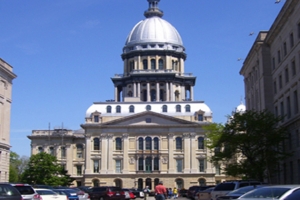
By Illinois Radio Network
SPRINGFIELD – An analysis of election data over the last decade highlights where Illinois’ Republican Party lost the competitive swing of Illinois’ electoral fight with Democrats.
In 2010, the midwestern states surrounding Illinois saw what the Center for Illinois Politics called a “red wave,” turning formerly Democratic stronghold states such as Wisconsin in a major GOP coup that helped send President Donald Trump to the White House six years later.
But Illinois stands out as a blue island surrounded by Republican-dominated states, thanks to a Democratic takeover of the former GOP strongholds in DuPage, Kane, Lake, McHenry and Will counties.
“Data analyzed by the Center for Illinois Politics finds that the stomping grounds of Republican leaders like Phil Crane, Peter Roskam and even Dennis Hastert have steadily increased Democratic numbers on their county boards since 2010, without exception,” according to the report. “At the same time, those counties’ Democratic voting percentages in each cycle’s U.S. Senate race have also increased.”
In 2010, the collar counties – the analysis spotlights Lake County – were key in sending moderate Republican Mark Kirk to the U.S. Senate over Democratic contender Alexi Giannoulias. In 2016, Lake County went to Kirk’s opponent, Democrat Tammy Duckworth, as well as electing the first Democratic majority on its county board in nearly a decade.
Why did those former Republican strongholds turn blue? The analysis said the key was independent suburban women.
“They focus on issues of healthcare, safety, environment, and education,” said Susan Garrett, chairwoman of the Center for Illinois Politics and a former Democratic state lawmaker from Lake County. “These core issues are extremely appealing to suburban women who consistently turn out in greater numbers.”
Property taxes, Garrett said, remains a core concern for suburban voters. She said that the Illinois GOP has dominated that discussion, but it lost ground among independent women voters who weigh those other issues against the cost of property taxes.
She also said GOP party leaders made it difficult for moderate Republicans by interjecting party stances on social issues such as abortion, dividing suburban women further.
Mary Morrissey, executive director of the Illinois Democratic Party, said the problem in 2018 was punctuated by the sometimes crass language of President Donald Trump and how poorly that was received by moderate suburban women.
“These are women who either have children or have raised children and taught them to treat others in a certain way,” she said. “The president’s communication style, I think, offended a lot of women.”
Morrissey said many of those moderate voters in the suburbs turned out for Democrats in 2018, leading to a number of typically Republican-held seats go to Democrats.
“That was a significant factor in the elections of Lauren Underwood in the 14th Congressional District, Sean Casten in the 6th Congressional District, and the near election of Betsy Dirksen-Londrigan in Central Illinois,” she said.
Garrett said political gerrymandering through the legislative map-making process long controlled by Illinois Democrats was a factor in swinging the balance away from Republicans, but said many suburban state and congressional districts once thought to be entirely safe for the GOP were now held by Democrats.
Others in the GOP contend that moderates like Mark Kirk led to disaffected conservative voters who felt their local political party had strayed from the platform. This was on display in 2018, when Wheaton state Rep. Jeanne Ives shocked the state by coming within striking distance of ousting then-Gov. Bruce Rauner in a primary race where she was vastly outspent by the multi-millionaire incumbent.
The other side of the coin is that moderate democrats couldn’t come off as too liberal because independent suburban voters wouldn’t align themselves with that, Morrissey said.
When asked if she thinks the political pendulum will swing back in suburban Republicans’ favor in coming cycles, Morrissey said no, unless the Illinois GOP takes a more moderate turn.
“I don’t foresee, in the near future, a complete reversal of the trends that we’ve seen in the suburbs unless there is a change in the Republican Party in terms of the dynamics in the Republican primaries,” she said. “If more social moderates begin to get elected in those areas, then you might see more of a realignment.”
A spokesman for the Illinois GOP did not respond to questions about the analysis.
Illinois Radio Network can be reached at [email protected].






